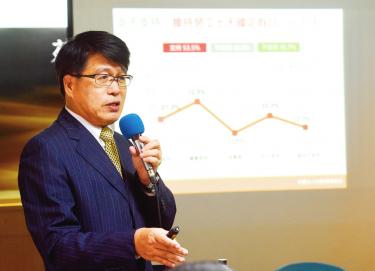President Tsai Ing-wen’s (蔡英文) approval rating has sunk to 41.4 percent, according to the latest poll by the Taiwanese Public Opinion Foundation, lower than her disapproval rating for the first time in the foundation’s polls, suggesting a leadership crisis.
The poll was released yesterday to mark Tsai’s six-month anniversary of taking office.
The poll found her approval rating had dropped to a new low of 41.4 percent, while her disapproval rating had climbed to 42.6 percent.
Tsai had an approval rating of 69.9 percent and an disapproval rating of 8.8 percent in May.
“The Tsai administration has been in office for six months and found itself at odds with the majority of the public. Few administrations have experienced such [a rapid fall in popularity],” foundation chairman You Ying-lung (游盈隆) said. “It is clear that Tsai is facing a crisis of political authority and personal leadership.”
The decline in support might be partly due to the failure of Tsai’s government to stimulate the economy, as well as dissatisfaction among pro-independence voters over her China policy, as they wanted the president to take a tougher line with Beijing, You said.
The poll found that 55.6 percent of respondents were dissatisfied with the government’s economic performance, while 36.3 percent were satisfied.
As for Tsai’s handling of cross-strait ties, 47.8 percent of respondents said they were not satisfied with her performance, up from the 39.7 percent who felt that way in an August poll, while 41.2 percent said they were satisfied, down from 51.4 percent in the previous poll.
Fifty-two percent of respondents said Premier Lin Chuan’s (林全) Cabinet was incompetent, while 30.7 percent said it was capable of solving problems.
As for the proposed workweek policy, 41.2 percent of respondents supported the five-day policy, which would introduce a regular day off and a “flexible rest day,” while 47.5 percent were against it.
A plan to reduce national holidays by seven days was opposed by 53.5 percent of respondents, while 35.7 percent supported it.
The proposed easing of a ban on food imports from five Japanese prefectures after the Fukushima nuclear disaster was opposed by 76.3 percent of respondents, with just 19.2 percent supporting it.
As for the drive to legalize same-sex marriage, 46.3 percent of respondents supported the move and 45.4 percent opposed it.
“The Tsai administration does not seem to understand what concerns young people, who object to the proposed cancelation of seven holidays to secure a few days of rest because a better salary is not attainable,” former Democratic Progressive Party (DPP) legislator Lin Chung-cheng (林忠正) said.
National Dong Hwa University professor Shih Cheng-feng (施正鋒) said Tsai is an incapable leader because she does not have a stance on key policies, such as national defense and nuclear waste management.
Tsai has failed to tame the bureaucracy or unite the DPP caucus, while the Cabinet has failed to take the initiative to introduce bills and reforms, and disagreements among DPP legislators are stalling the legislative process, Shih said.
The poll, conducted on Monday and Tuesday last week, collected 1,098 valid samples and has a margin of error of 2.98 percentage points.
Source: Taipei Times - 2016/11/29





















